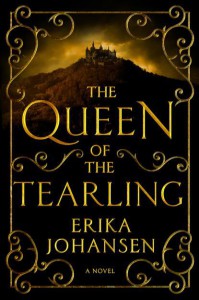Scavenging Book Stores and Libraries
Currently I'm a librarian and before that I was an archaeologist, a journalist, and definitely a bit of a world traveler. I tend to mostly read science fiction and fantasy, though I do love a good mystery and I'm a bit of a book dabbler overall. I've been doing Goodreads for awhile, but a friend thought I might enjoy this as well. Let's see, yeah?
After the Crossing...

I got another free egalley from Edelweiss because a coworker said I HAD to read The Queen of the Tearling and, though it’s pushed my TBR pile back even further, I’m glad I did. It was an interesting novel. It kind of reminded me of Sheri S. Tepper in theme, if not in style.
So, setting the stage here, The Queen of the Tearling is a post-apocalyptic fantasy with this thin, but strong veneer of science overlaying it. It’s our world, but something happened hundreds (I think) years ago and the survivors crossed the sea to find new homes. We don’t know what happened and why the U.S. was hit so hard – just that the current characters are descended from Americans. We also don’t know how they received or claimed new land either. They seem to be on Earth, still, but there isn’t any real indication of where they actually are.
Anyway, our protagonist is the young heir of the kingdom of Tearling. This is a tiny land that is greatly overshadowed by a powerful and cruel neighboring nation. The heir comes of age at the beginning of the novel and must sneak back to the capital and be crowned before anyone can assassinate her because the Regent does not want to give up his power. She’s been trained to govern every day of her life, but many secrets have been kept from her – pretty much anything about her parents and everything to do with a mysterious treaty with that scary country next door.
Oh yeah, and magic seems to exist now, for some reason.
There are many things that are unexplained.
Now some of this really ramps up the tension – not that we needed it with assassinations and plotting and noble rescues of defenseless commoners and magical happened and such are going on – but some of it just seems… coy. I imagine the rest of the history will be doled out in subsequent books (more is definitely planned to come), but more could have been explored now as well. I understand why we don’t know much about current events since our hero doesn’t know any of this stuff. However, it seemed like she does know the history, so I would have liked to get that. I think it would have enriched the story because it would allow the reader to focus on the current mysteries instead of having their brain niggled wondering about the past.
I had to give the book four stars because it just felt a little unpolished to me. However, it’s a debut novel and, of course, it was an egalley so not necessarily the final form yet. The published copy may not have the rough edges.
The last thing I want to mention is that “veneer of science.” There is awareness in the book that past technologies and knowledge existed, though most have been lost. However, some of it seems to be known – how much isn’t clear. An example, though, is that genetics get mentioned and this is strongly tied to the ideas of bloodlines. I’m not sure whether the author is trying to show that the knowledge is degraded or if she’s positioning herself very firmly on the side of “nature” as opposed to “nurture.”
Characters ponder a decent bit about the protagonist’s father and how his bloodline must have affected her greatly since her mother’s side of the family is pretty… not impressive. Of course, I kept thinking, “Well that probably has to do with the two people who raised her and their education and philosophies and ethics and parenting skills…” but I don’t recall anyone in the book thinking that at all. Just that she shows the injection of hood blood into her family line.
A major place where this scientific feel shows up is in the discussion of religion. The Christian church does still exist in this future – not just the usual cruel monotheistic religion trope, but the actual Christian church. Even before we find out it’s corrupt, there’s plenty of discussion about the detriments of the religion on humanity. Living where I live, I will have to be somewhat careful about recommending this book to patrons because I live in a rather religious part of the country. Not only would this offend some of my library customers, but it also might strengthen the “science hates religion” fallacy that people have. The character does meet a non-corrupt church fellow, so it begins to equalize a bit out later. It will be interesting to see where the author takes this in future books.
 1
1






